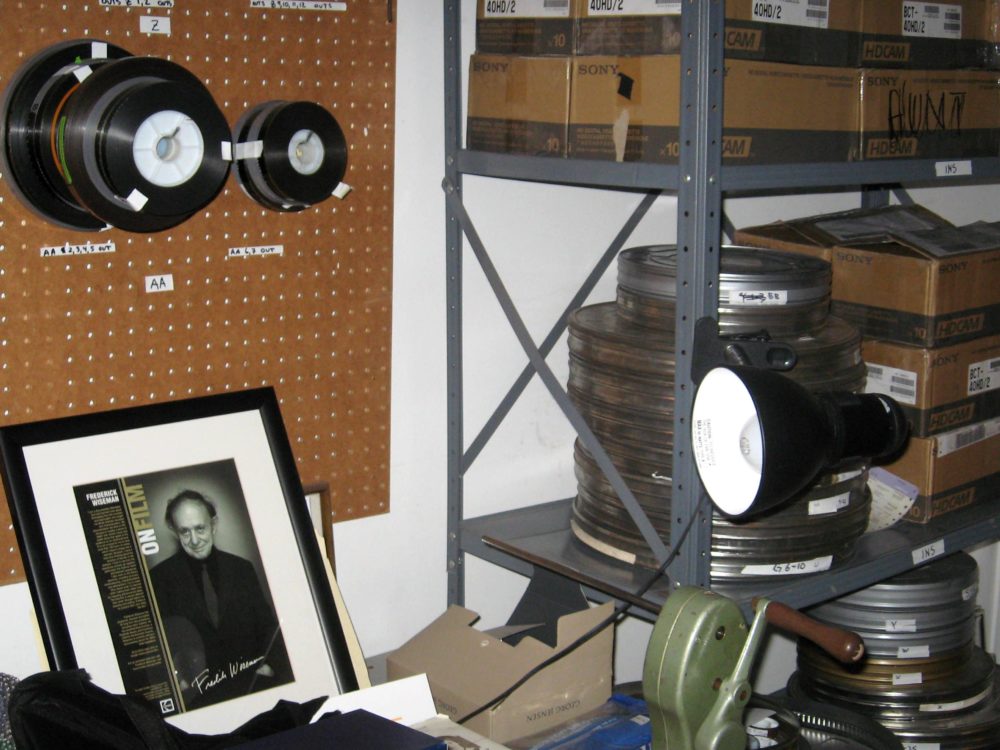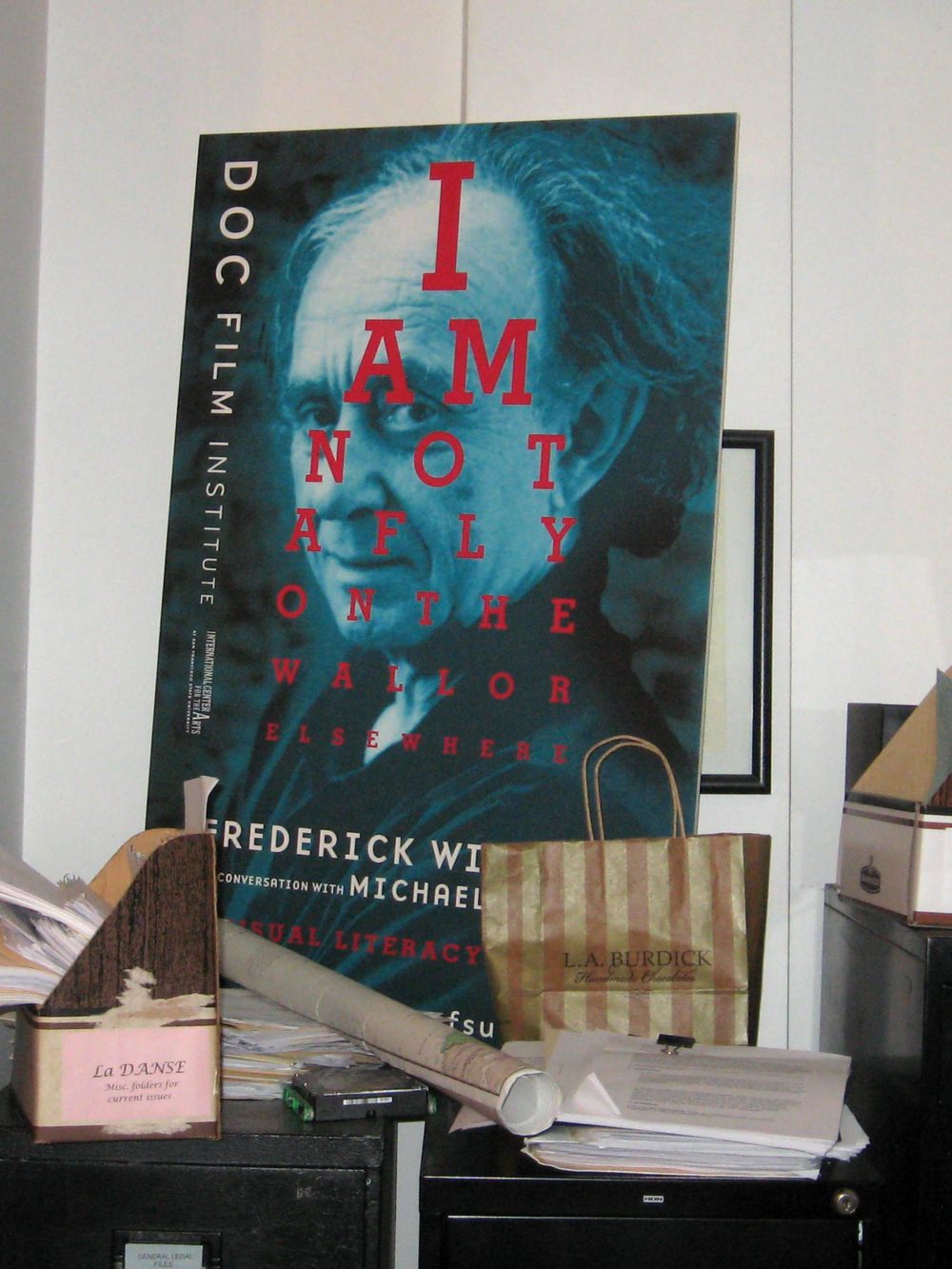Advertisement
Wiseman on Boxing
"One of the interesting things about the gym for me was the class mixture. Because there are people, upper class, middle class, lower class, people from all classes, and they get along. Everybody got along.”
Wiseman, who will turn 81 next month, has been making documentary films since 1966. He spent about one hundred hours in Lord’s Gym in Austin, Texas collecting material. He was particularly impressed by the concern those in the ring and outside of it expressed for each other.
“I mean,” he said, “there’s one point in the gym where a guy says to a newcomer, ‘We all try to help each other out here, and even though it’s a violent sport, nobody can be violent unnecessarily. We all try to cooperate and collaborate.’”
 We were speaking in Mr. Wiseman’s Cambridge, Massachusetts studio, which is cluttered with canisters of film, posters for various movies, and a lot of awards. Mr. Wiseman cheerfully acknowledged that he began this project with the general feeling that he liked boxing. He became fond of the man who owns and runs the Texas gym, Richard Lord, and admired Lord’s inclination to welcome anybody who was interested in training there…an inclination that’s apparent throughout the movie, which includes, among other folks, a mom and her very young baby.
We were speaking in Mr. Wiseman’s Cambridge, Massachusetts studio, which is cluttered with canisters of film, posters for various movies, and a lot of awards. Mr. Wiseman cheerfully acknowledged that he began this project with the general feeling that he liked boxing. He became fond of the man who owns and runs the Texas gym, Richard Lord, and admired Lord’s inclination to welcome anybody who was interested in training there…an inclination that’s apparent throughout the movie, which includes, among other folks, a mom and her very young baby.“Well,” Wiseman said, “that’s part of the attitude Richard Lord fostered among the people who came to the gym. You come, you bring your baby, keep an eye on your baby, and work out if you want. So some young parents brought their kids. In that case she was practically a newborn.”
You come, you bring your baby, keep an eye on your baby, and work out if you want.
Frederick Wiseman
In one particularly striking segment, one boxer talks about how much he enjoys the feeling of being “buzzed” after he’s taken a punch to the jaw. I asked Frederick Wiseman if his choice of what to use in the ninety minute movie that he whittled out of about one hundred hours of film constituted editorializing.
“Of course,” he said. “There is a directorial point of view. These movies are made in a way that’s the reverse of Hollywood movies. In making a Hollywood movie, or a normal fiction movie, you start with a script, and you shoot the script. In my movies, I go in with absolutely no script, but over the course of anywhere from four to twelve weeks, shoot anywhere from seventy five to a hundred fifty hours, and I find the film in the editing. There’s the old bromide about the sculptor finding the statue under the stone; I find the film under the rushes.”
Advertisement
Viewers of “Boxing Gym” are bound to be struck by the rhythms of the place. As Frederick Wiseman told me, “It’s almost musical. In fact, it is musical. And I tried to preserve it in the editing of the film.”
At Lord’s Gym, Frederick Wiseman found the percussion of gloves against the heavy bag and the staccato rhythm of speed bag, the shuffle and stride of shadow boxers, and the grunts and gasps of people getting into shape, or trying to do that, or fooling themselves into thinking it could happen again. Some of Wiseman’s audience will be surprised at how little actual boxing occurs during the film.
“The people you see in the movie are people who like boxing as a sport,” Wiseman told me. “They like the physical training that’s involved in boxing, and once a week at the gym there was sparing, and the sparing is a bit more violent than the shadow boxing.”

Over the past forty four years, during which he has made thirty six documentaries, Frederick Wiseman has maintained the same patient and disciplined approach to his work. Each film is different, of course, but he’s found that one particular theme has surfaced as many of the films
have revealed themselves during his editing process. His first documentary, Titicut Follies, presented the day-to-day routines of a hospital for the criminally insane in Bridgewater, Massachusetts.
“Titicut Follies is about people who have committed the most violent acts imaginable, or many of the people at Bridgewater had,” Wiseman said. “Law and Order is about the Kansas City Police, and how they try to contain violent behavior. Juvenile Court is a film about how adolescents who’ve committed deviant or violent acts get punished. Domestic Violence is, obviously, domestic violence between people. The military films, Basic Training and Missile, are about the state’s monopoly of violence in the interests of protecting the interests of the state. And boxing – one aspect of boxing – is that it’s ritualized and controlled violence.”
Some of Frederick Wiseman’s films have been controversial. Titicut Follies was banned in Massachusetts for 25 years, allegedly for violating the privacy of its subjects. Wiseman says it was because of worries on the part of some of the people who gave him permission to make the film that its release would embarrass them. But Boxing Gym is not likely to outrage anyone involved. It doesn’t feel like an expose, but rather like an exploration of the complexity of a culture in which aggression is less apparent than cooperation, and in which the ambitions of those who feel they’re on the way up are contrasted with the delusions of those who’ve failed to accept that their most glorious days are behind them.
 At one point the camera captures two fighters as they try to reassure each other that if they had another shot, they could each beat boxers who’d beaten them.
At one point the camera captures two fighters as they try to reassure each other that if they had another shot, they could each beat boxers who’d beaten them.“There’s a lot of fantasy. And a lot of ‘I’m really gonna do it tomorrow,’ Frederick Wiseman said. “It’s like the characters in The Ice Man Cometh. And I found it sad, and everybody’s gonna be a world champion tomorrow, or beat the guy that beat you three years ago. It’s sad, it’s sustaining, and at least I had the sense that it’s never going to happen.”
Despite the depiction of that sadness, Richard Lord, who tells all potential clients that Lord’s Gym operates on a strictly cash up front basis, was happy with the film.
“He and his wife and his son came up here as soon as I finished the movie, and I showed it to them,” Wiseman said. “And they liked it, which, of course, pleases me.”
When I wondered if the film might provoke an increase in business at Lord’s Gym so spectacular that the proprietor might have to begin accepting credit cards, Mr. Wiseman smiled and said, “I think he’s capable of dealing with whatever happens.”
When I asked Frederick Wiseman whether he feels empty or let down after he’s finished the months and months of editing that his films require, he smiled and acknowledged that he did, but he told me that since he began making films in 1966, he’s never paused for long.
“There’s always post-partem depression, but once I became aware of it, I started planning the next film two or three months before I thought I was going to finish the one I’m working on, so that I can take a short break and go skiing or something, then get started again. Because I like to work. You work very intensely over long hours, and then suddenly it’s over, so it’s good to both take a break, and then it’s good, particularly for me, to have something else to do right away.”
“Okay,” I said. “So what’s the next project?”
“The next project is a movie about a night club in Paris,” he said. “I’m in the midst of editing it at the moment. Hard work, but somebody has to do it.”
Boxing Gym, which has been showing in selected theaters this fall, will be screened Saturday in Rochester, New York, and at the DeBartolo Performing Arts Center on the campus of Notre Dame University. Next week you can catch it in Hartford, Connecticut; Columbus, Ohio; or Jackson, Mississippi.
This segment aired on December 4, 2010.
